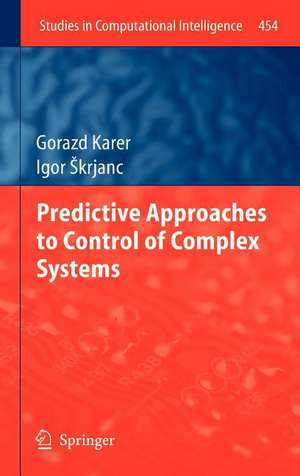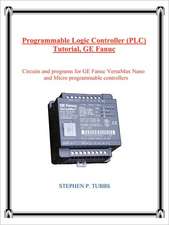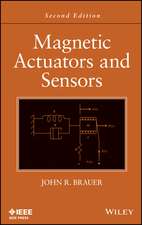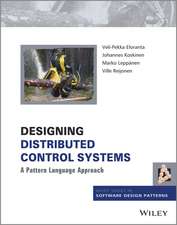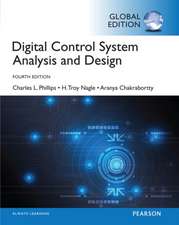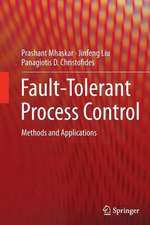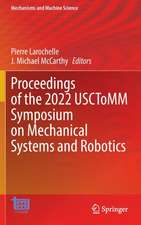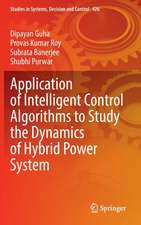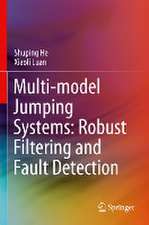Predictive Approaches to Control of Complex Systems: Studies in Computational Intelligence, cartea 454
Autor Gorazd Karer, Igor Škrjancen Limba Engleză Hardback – 21 sep 2012
This book first introduces some modeling frameworks, which can encompass the most frequently encountered complex dynamical phenomena and are practically applicable in the proposed predictive control approaches. Furthermore, unsupervised learning methods that can be used for complex-system identification are treated. Finally, several useful predictive control algorithms for complex systems are proposed and their particular advantages and drawbacks are discussed. The presented modeling, identification and control approaches are complemented by illustrative examples. The book is aimed towards researches and postgraduate students interested in modeling, identification and control, as well as towards control engineers needing practically usable advanced control methods for complex systems.
| Toate formatele și edițiile | Preț | Express |
|---|---|---|
| Paperback (1) | 639.25 lei 6-8 săpt. | |
| Springer Berlin, Heidelberg – 15 oct 2014 | 639.25 lei 6-8 săpt. | |
| Hardback (1) | 641.71 lei 6-8 săpt. | |
| Springer Berlin, Heidelberg – 21 sep 2012 | 641.71 lei 6-8 săpt. |
Din seria Studies in Computational Intelligence
- 20%
 Preț: 449.37 lei
Preț: 449.37 lei - 20%
 Preț: 1158.26 lei
Preț: 1158.26 lei - 20%
 Preț: 986.66 lei
Preț: 986.66 lei - 20%
 Preț: 1452.76 lei
Preț: 1452.76 lei - 20%
 Preț: 168.78 lei
Preț: 168.78 lei - 20%
 Preț: 1291.10 lei
Preț: 1291.10 lei - 18%
 Preț: 1112.30 lei
Preț: 1112.30 lei - 20%
 Preț: 565.39 lei
Preț: 565.39 lei - 20%
 Preț: 649.28 lei
Preț: 649.28 lei - 20%
 Preț: 1047.73 lei
Preț: 1047.73 lei - 20%
 Preț: 1578.96 lei
Preț: 1578.96 lei - 20%
 Preț: 643.50 lei
Preț: 643.50 lei - 20%
 Preț: 657.49 lei
Preț: 657.49 lei - 20%
 Preț: 993.28 lei
Preț: 993.28 lei - 20%
 Preț: 990.80 lei
Preț: 990.80 lei - 20%
 Preț: 989.96 lei
Preț: 989.96 lei - 20%
 Preț: 1165.69 lei
Preț: 1165.69 lei - 20%
 Preț: 1444.52 lei
Preț: 1444.52 lei - 20%
 Preț: 1041.96 lei
Preț: 1041.96 lei - 20%
 Preț: 1047.73 lei
Preț: 1047.73 lei - 20%
 Preț: 1046.06 lei
Preț: 1046.06 lei - 18%
 Preț: 2500.50 lei
Preț: 2500.50 lei - 20%
 Preț: 989.13 lei
Preț: 989.13 lei - 20%
 Preț: 1165.69 lei
Preț: 1165.69 lei - 20%
 Preț: 1164.05 lei
Preț: 1164.05 lei - 20%
 Preț: 1042.79 lei
Preț: 1042.79 lei - 20%
 Preț: 1460.19 lei
Preț: 1460.19 lei - 18%
 Preț: 1403.52 lei
Preț: 1403.52 lei - 18%
 Preț: 1124.92 lei
Preț: 1124.92 lei - 20%
 Preț: 1039.47 lei
Preț: 1039.47 lei - 20%
 Preț: 1008.11 lei
Preț: 1008.11 lei - 20%
 Preț: 1045.25 lei
Preț: 1045.25 lei - 20%
 Preț: 1275.42 lei
Preț: 1275.42 lei - 20%
 Preț: 1040.32 lei
Preț: 1040.32 lei - 20%
 Preț: 988.32 lei
Preț: 988.32 lei - 20%
 Preț: 1169.79 lei
Preț: 1169.79 lei - 20%
 Preț: 1162.37 lei
Preț: 1162.37 lei - 20%
 Preț: 1059.26 lei
Preț: 1059.26 lei - 20%
 Preț: 1164.05 lei
Preț: 1164.05 lei - 20%
 Preț: 1166.52 lei
Preț: 1166.52 lei - 20%
 Preț: 1459.38 lei
Preț: 1459.38 lei - 18%
 Preț: 1005.74 lei
Preț: 1005.74 lei - 20%
 Preț: 997.38 lei
Preț: 997.38 lei - 20%
 Preț: 1055.94 lei
Preț: 1055.94 lei - 20%
 Preț: 1284.47 lei
Preț: 1284.47 lei - 20%
 Preț: 994.08 lei
Preț: 994.08 lei - 20%
 Preț: 1048.72 lei
Preț: 1048.72 lei - 20%
 Preț: 1066.02 lei
Preț: 1066.02 lei - 20%
 Preț: 943.78 lei
Preț: 943.78 lei - 20%
 Preț: 1173.10 lei
Preț: 1173.10 lei
Preț: 641.71 lei
Preț vechi: 754.95 lei
-15% Nou
Puncte Express: 963
Preț estimativ în valută:
122.81€ • 127.74$ • 101.38£
122.81€ • 127.74$ • 101.38£
Carte tipărită la comandă
Livrare economică 14-28 aprilie
Preluare comenzi: 021 569.72.76
Specificații
ISBN-13: 9783642339462
ISBN-10: 3642339468
Pagini: 272
Ilustrații: XII, 260 p.
Dimensiuni: 155 x 235 x 20 mm
Greutate: 0.45 kg
Ediția:2013
Editura: Springer Berlin, Heidelberg
Colecția Springer
Seria Studies in Computational Intelligence
Locul publicării:Berlin, Heidelberg, Germany
ISBN-10: 3642339468
Pagini: 272
Ilustrații: XII, 260 p.
Dimensiuni: 155 x 235 x 20 mm
Greutate: 0.45 kg
Ediția:2013
Editura: Springer Berlin, Heidelberg
Colecția Springer
Seria Studies in Computational Intelligence
Locul publicării:Berlin, Heidelberg, Germany
Public țintă
ResearchCuprins
Introduction .- Modeling of complex systems for predictive control .- Modeling an identification of a batch reactor.- Predictive control of complex systems.- Predictive control of complex systems.
Recenzii
“The book deals with the theoretical background of predictive control approaches for complex systems, as well, as for application of developed control methods to batch reactors. … The book is dedicated to both researchers and practitioners working on advanced control methods for complex systems who are interested in the application of soft computing methods in the framework of predictive control.” (Krzysztof Gałkowski, zbMATH 1311.93001, 2015)
Textul de pe ultima copertă
A predictive control algorithm uses a model of the controlled system to predict the system behavior for various input scenarios and determines the most appropriate inputs accordingly. Predictive controllers are suitable for a wide range of systems; therefore, their advantages are especially evident when dealing with relatively complex systems, such as nonlinear, constrained, hybrid, multivariate systems etc. However, designing a predictive control strategy for a complex system is generally a difficult task, because all relevant dynamical phenomena have to be considered. Establishing a suitable model of the system is an essential part of predictive control design. Classic modeling and identification approaches based on linear-systems theory are generally inappropriate for complex systems; hence, models that are able to appropriately consider complex dynamical properties have to be employed in a predictive control algorithm.
This book first introduces some modeling frameworks, which can encompass the most frequently encountered complex dynamical phenomena and are practically applicable in the proposed predictive control approaches. Furthermore, unsupervised learning methods that can be used for complex-system identification are treated. Finally, several useful predictive control algorithms for complex systems are proposed and their particular advantages and drawbacks are discussed. The presented modeling, identification and control approaches are complemented by illustrative examples. The book is aimed towards researches and postgraduate students interested in modeling, identification and control, as well as towards control engineers needing practically usable advanced control methods for complex systems.
This book first introduces some modeling frameworks, which can encompass the most frequently encountered complex dynamical phenomena and are practically applicable in the proposed predictive control approaches. Furthermore, unsupervised learning methods that can be used for complex-system identification are treated. Finally, several useful predictive control algorithms for complex systems are proposed and their particular advantages and drawbacks are discussed. The presented modeling, identification and control approaches are complemented by illustrative examples. The book is aimed towards researches and postgraduate students interested in modeling, identification and control, as well as towards control engineers needing practically usable advanced control methods for complex systems.
Caracteristici
Presents control of time-delayed, unstable, multivariable processes and modelling approaches for several classes of complex systems Special emphasis is put on hybrid systems with distinct nonlinearities Treats time-varying systems and adaptive approaches employing online identification that results in models suitable for predictive control
